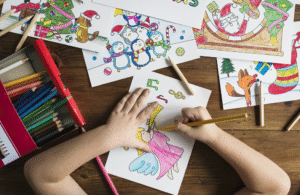In a world increasingly dominated by screens and digital distractions, cultivating a love of reading in your child is more important and more challenging than ever before. Reading is not simply a school subject or an educational milestone; it is a life skill that unlocks critical thinking, empathy, creativity, and communication.
When children learn to love reading from an early age, they build a foundation that enhances every aspect of their cognitive and emotional development. The challenge for many parents isn’t knowing why reading matters it’s knowing how to make it part of their child’s identity.
This guide is designed to help you nurture a reading habit in your child, no matter their age or temperament, by providing practical, proven strategies and an understanding of how reading develops through early childhood and beyond.
The Long-Term Benefits of Raising a Reader
Before diving into the “how,” it’s worth understanding just how profound an impact reading can have. Research from the American Academy of Pediatrics shows that daily reading from infancy increases brain development, enhances emotional bonding, and promotes stronger language skills.
Children who grow up reading regularly are more likely to:
- Excel academically
- Express themselves clearly
- Develop strong concentration
- Solve problems with creativity
- Demonstrate compassion and emotional intelligence
The goal isn’t to produce early readers but to cultivate engaged readers who read not just because they have to, but because they want to.
Stage-by-Stage: How Reading Skills Develop
Every child’s reading journey unfolds differently, but here’s a general guide to how reading evolves across developmental stages;
- Infancy to Toddlerhood (0–2 Years)
- Focus on listening and recognizing sounds.
- Children explore books by touching, mouthing, and flipping pages.
- They begin to associate stories with comfort and connection.
Parental Role:
- Read aloud every day.
- Choose board books with high-contrast images and rhythm.
- Use expressive voices and maintain eye contact.
- Preschool (3–5 Years)
- Children begin recognizing letters, rhyming patterns, and storytelling structure.
- They may “pretend” to read or memorize parts of familiar books.
Parental Role:
- Introduce the alphabet in a fun way.
- Let them retell stories in their own words.
- Ask open-ended questions about the story.
- Early School Years (6–8 Years)
- Children transition from “learning to read” to “reading to learn.”
- Vocabulary expands rapidly, and comprehension improves.
Parental Role:
- Encourage independent reading alongside shared reading.
- Provide books that match their interests and reading level.
- Continue reading aloud even as they begin reading solo.

12 Effective Ways to Help Your Child Become a Reader
1. Start Early — And Never Stop
Reading should begin as early as birth and continue long after your child can read independently. Shared reading strengthens your bond and models fluent, expressive language.
2. Create a Reading Culture at Home
Children mirror what they see. Surround them with books, newspapers, and magazines. Designate a cozy corner for reading with natural light and soft seating.
Display books where children can reach them baskets in the living room, a shelf near the bed, even a few titles in the kitchen.
3. Let Your Child Choose Their Books
Choice is a powerful motivator. Visit libraries or bookstores and let your child explore different genres. Whether it’s fairy tales, graphic novels, or nature encyclopedias what matters is engagement, not format.
4. Make Reading Interactive
Reading is more than decoding text it’s about connection. While reading together:
- Ask questions like “Why do you think that happened?”
- Predict what might come next.
- Pause and let them describe pictures.
These strategies deepen comprehension and critical thinking.
5. Use Reading to Spark Conversation
After finishing a book, continue the discussion. Ask your child how they felt about the story, what they learned, or which character they liked best. These conversations reinforce reflection and retention.
6. Connect Books to Real Life
When possible, link stories to experiences. After reading about animals, visit a zoo. If the story is about baking, try a recipe together. Reading becomes more meaningful when it’s tied to action.
7. Be Patient With Struggles
Not every child takes to reading quickly. If your child struggles:
- Avoid showing frustration.
- Provide support with phonics or reading apps.
- Celebrate small wins: a new word, a finished sentence, or increased focus.
And if needed, consult their teacher or a literacy specialist for targeted support.
8. Read Aloud — Even After They Can Read Themselves
Reading aloud shouldn’t stop once your child is reading independently. It builds listening skills, exposes them to more complex vocabulary, and offers a shared emotional experience.
Choose longer chapter books and read a few pages each night it becomes something they look forward to.
9. Limit Screen Time to Prioritize Book Time
Make reading the default activity in moments of downtime. Keep books in the car, near the bed, or in your bag. The more reading is visible and accessible, the more naturally it becomes a habit.
10. Celebrate Progress Without Pressure
Turn achievements into mini celebrations:
- A sticker chart for reading time
- A family “book of the week”
- A video call to a grandparent to share a story
The goal is to associate reading with joy not performance.
11. Introduce Audiobooks and Podcasts
These are excellent tools for developing listening comprehension and narrative understanding. Use them during car rides or bedtime routines.
Tip: Audible’s Kids Collection and free public domain sites like Loyal Books offer great options.
12. Lead by Example
If your child never sees you reading, they may view it as a chore. Let them catch you reading regularly. Talk about what you’re reading, share interesting facts, and create family reading times where everyone has a book in hand.
Conclusion: Raising a Reader Is a Journey — Not a Race
Your goal as a parent isn’t to produce the fastest or most advanced reader it’s to nurture a child who sees books as companions, not obligations. It’s about building confidence, curiosity, and connection one story at a time.
And remember, reading is not just about school. It’s about life. The worlds your child enters through books will shape the person they become their imagination, their resilience, their empathy.
With your steady support and presence, you can help your child not just learn to read but love it for a lifetime.
Faqs
1. At what age should I start reading to my child?
You can begin reading to your child as early as infancy—even newborns benefit from hearing your voice, rhythm, and tone. Reading aloud from birth helps develop language skills, listening comprehension, and emotional bonding. By age one, babies begin to recognize words and associate books with comfort and curiosity.
2. How much time should my child spend reading each day?
Aim for at least 15–20 minutes of reading per day, depending on your child’s age. This can include independent reading, reading aloud together, or listening to audiobooks. Consistency is more important than duration—daily reading builds vocabulary, fluency, and a love for books over time.
3. What if my child doesn’t enjoy reading
If your child resists reading, try different genres, formats, or reading environments:
- Explore graphic novels, magazines, or audiobooks
- Let them choose books based on their interests
- Create a cozy, distraction-free reading space
Avoid forcing them—make reading feel like a fun choice, not a chore.
4. How can I support my child’s reading development at home?
- Read aloud regularly—even for older kids
- Visit the library and let them pick books
- Ask open-ended questions like, “What do you think happens next?”
- Be a reading role model: let them see you enjoy books
- Use daily life as reading practice (menus, signs, recipes)
These actions reinforce that reading is both useful and enjoyable.
5. Are digital books or apps effective for building literacy?
Yes, when used wisely. E-books and educational reading apps can supplement traditional reading and engage tech-savvy kids. Choose high-quality, interactive tools that emphasize storytelling, vocabulary, and comprehension. However, balance screen-based reading with print to encourage deep focus and minimize distraction.
Explore trusted reading tools at Reading Rockets.



